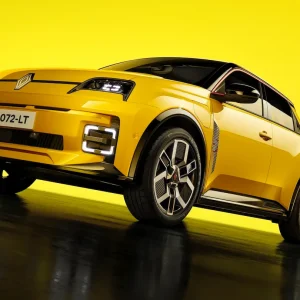7. Modern petrol
Eco fuel rating 56%
What is it? Advancements to the traditional internal combustion engine including variable-valve, direct-injection, stop-start and turbocharging technology, as well as downsized engine capacity while keeping high power outputs.
For Economy and CO2 improving with new tech to near diesel levels, but without as high local air pollutants; Lower list price compared to diesel and hybrid models; Just beats CNG due to availability and practicality.
Against Generally still higher CO2 than diesel and thus tax for drivers.
Who are the market leaders? BMW and PSA Peugeot/Citroen.
6. Hydrogen engine
Eco fuel rating 60%
What is it? Changes to the internal combustion engine allow it to run on pumped-in hydrogen.
For Only tailpipe emission is water vapour; Hydrogen fuel needed is potentially endlessly renewable.
Against High technology cost; Limited range of current vehicles; Only one refueling spot in UK; Storage issues; BMW is the only maker putting time and budget into it – others are taking the more popular hydrogen fuel cell route.
Who are the market leaders? BMW sees it as a quicker way to solve emissions issues than fuel cell. Some hydrogen-powered 7-series cars are already available for special lease globally.
5. Fuel cell
Eco fuel rating 60%
What is it? An electrochemical cell in which the energy of a reaction between a fuel, such as liquid hydrogen, and an oxidant, such as liquid oxygen, is converted into electrical energy to power an electric motor. The energy for the fuel cell can come from pumped-in hydrogen, or an in-vehicle generator that creates hydrogen onboard.
For Only tailpipe emission is water vapour; Hydrogen fuel needed is potentially endlessly renewable; A great future tech, but not commercially viable until 2020 or later.
Against Prohibitive technology cost; Limited range of current vehicles; Only one refueling spot in UK. Storage issues.
Who are the market leaders? Many makers (which is why it just pips the hydrogen engine) have projects including DaimlerChrysler, GM and Honda , but progress is slow and expensive. A London bus also uses a hydrogen fuel cell.
4. Biofuels
Eco fuel rating 64%
What is it? A renewable energy source made from a variety of sources including crops, plants and plant waste that absorb CO2 as they grow, thus offsetting a large part of the CO2 emitted when used within internal combustion engines. Current-tech biofuels can be mixed with petrol or diesel at blends up to 85% for best eco results (thus the moniker E85 for such blends).
For From a ‘well-to-wheel’ (whole-life production and use) perspective it measures up very well in CO2 terms; Renewable nature makes its future Government acceptance and viability look bright; Can be blended in small amounts with petrol and diesel with little or no modification to existing engines.
Against Tiny fuelling infrastructure network; Low subsidies; Poor fuel efficiency compared to petrol and diesel.
Who are the market leaders? Saab and Ford have models that can run on E85 today, and Peugeot, Citroen and Renault have models that can run on lower bioethanol blends up to 30%. VW Group, Mercedes and others are looking into next-generation future biofuels.





